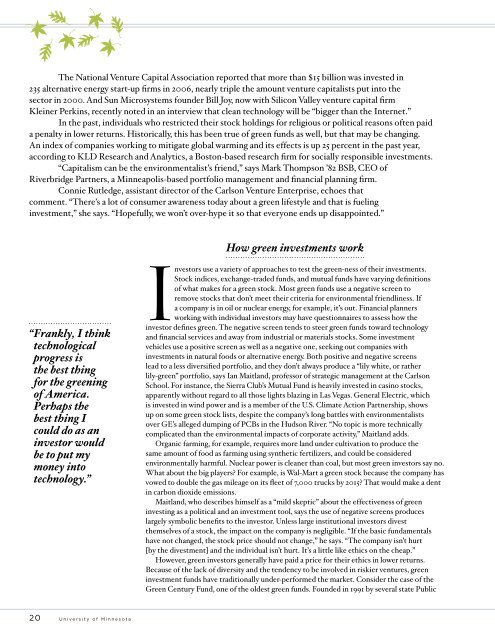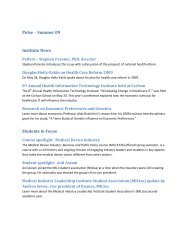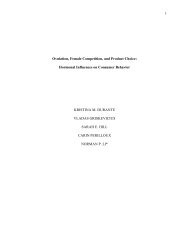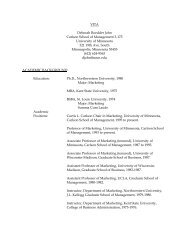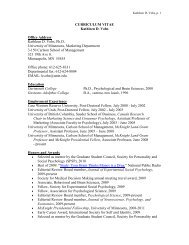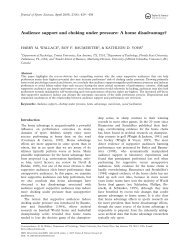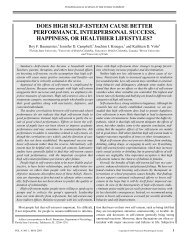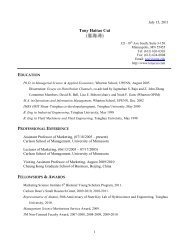Can you make money and save the planet - Carlson School of ...
Can you make money and save the planet - Carlson School of ...
Can you make money and save the planet - Carlson School of ...
You also want an ePaper? Increase the reach of your titles
YUMPU automatically turns print PDFs into web optimized ePapers that Google loves.
;<br />
;<br />
The National Venture Capital Association reported that more than $15 billion was invested in<br />
235 alternative energy start-up firms in 2006, nearly triple <strong>the</strong> amount venture capitalists put into <strong>the</strong><br />
sector in 2000. And Sun Microsystems founder Bill Joy, now with Silicon Valley venture capital firm<br />
Kleiner Perkins, recently noted in an interview that clean technology will be “bigger than <strong>the</strong> Internet.”<br />
In <strong>the</strong> past, individuals who restricted <strong>the</strong>ir stock holdings for religious or political reasons <strong>of</strong>ten paid<br />
a penalty in lower returns. Historically, this has been true <strong>of</strong> green funds as well, but that may be changing.<br />
An index <strong>of</strong> companies working to mitigate global warming <strong>and</strong> its effects is up 25 percent in <strong>the</strong> past year,<br />
according to KLD Research <strong>and</strong> Analytics, a Boston-based research firm for socially responsible investments.<br />
“Capitalism can be <strong>the</strong> environmentalist’s friend,” says Mark Thompson ’82 BSB, CEO <strong>of</strong><br />
Riverbridge Partners, a Minneapolis-based portfolio management <strong>and</strong> financial planning firm.<br />
Connie Rutledge, assistant director <strong>of</strong> <strong>the</strong> <strong>Carlson</strong> Venture Enterprise, echoes that<br />
comment. “There’s a lot <strong>of</strong> consumer awareness today about a green lifestyle <strong>and</strong> that is fueling<br />
investment,” she says. “Hopefully, we won’t over-hype it so that everyone ends up disappointed.”<br />
“ Frankly, I think<br />
technological<br />
progress is<br />
<strong>the</strong> best thing<br />
for <strong>the</strong> greening<br />
<strong>of</strong> America.<br />
Perhaps <strong>the</strong><br />
best thing I<br />
could do as an<br />
investor would<br />
be to put my<br />
<strong>money</strong> into<br />
technology.”<br />
20 University <strong>of</strong> Minnesota<br />
How green investments work<br />
Investors use a variety <strong>of</strong> approaches to test <strong>the</strong> green-ness <strong>of</strong> <strong>the</strong>ir investments.<br />
Stock indices, exchange-traded funds, <strong>and</strong> mutual funds have varying definitions<br />
<strong>of</strong> what <strong>make</strong>s for a green stock. Most green funds use a negative screen to<br />
remove stocks that don’t meet <strong>the</strong>ir criteria for environmental friendliness. If<br />
a company is in oil or nuclear energy, for example, it’s out. Financial planners<br />
working with individual investors may have questionnaires to assess how <strong>the</strong><br />
investor defines green. The negative screen tends to steer green funds toward technology<br />
<strong>and</strong> financial services <strong>and</strong> away from industrial or materials stocks. Some investment<br />
vehicles use a positive screen as well as a negative one, seeking out companies with<br />
investments in natural foods or alternative energy. Both positive <strong>and</strong> negative screens<br />
lead to a less diversified portfolio, <strong>and</strong> <strong>the</strong>y don’t always produce a “lily white, or ra<strong>the</strong>r<br />
lily-green” portfolio, says Ian Maitl<strong>and</strong>, pr<strong>of</strong>essor <strong>of</strong> strategic management at <strong>the</strong> <strong>Carlson</strong><br />
<strong>School</strong>. For instance, <strong>the</strong> Sierra Club’s Mutual Fund is heavily invested in casino stocks,<br />
apparently without regard to all those lights blazing in Las Vegas. General Electric, which<br />
is invested in wind power <strong>and</strong> is a member <strong>of</strong> <strong>the</strong> U.S. Climate Action Partnership, shows<br />
up on some green stock lists, despite <strong>the</strong> company’s long battles with environmentalists<br />
over GE’s alleged dumping <strong>of</strong> PCBs in <strong>the</strong> Hudson River. “No topic is more technically<br />
complicated than <strong>the</strong> environmental impacts <strong>of</strong> corporate activity,” Maitl<strong>and</strong> adds.<br />
Organic farming, for example, requires more l<strong>and</strong> under cultivation to produce <strong>the</strong><br />
same amount <strong>of</strong> food as farming using syn<strong>the</strong>tic fertilizers, <strong>and</strong> could be considered<br />
environmentally harmful. Nuclear power is cleaner than coal, but most green investors say no.<br />
What about <strong>the</strong> big players? For example, is Wal-Mart a green stock because <strong>the</strong> company has<br />
vowed to double <strong>the</strong> gas mileage on its fleet <strong>of</strong> 7,000 trucks by 2015? That would <strong>make</strong> a dent<br />
in carbon dioxide emissions.<br />
Maitl<strong>and</strong>, who describes himself as a “mild skeptic” about <strong>the</strong> effectiveness <strong>of</strong> green<br />
investing as a political <strong>and</strong> an investment tool, says <strong>the</strong> use <strong>of</strong> negative screens produces<br />
largely symbolic benefits to <strong>the</strong> investor. Unless large institutional investors divest<br />
<strong>the</strong>mselves <strong>of</strong> a stock, <strong>the</strong> impact on <strong>the</strong> company is negligible. “If <strong>the</strong> basic fundamentals<br />
have not changed, <strong>the</strong> stock price should not change,” he says. “The company isn’t hurt<br />
[by <strong>the</strong> divestment] <strong>and</strong> <strong>the</strong> individual isn’t hurt. It’s a little like ethics on <strong>the</strong> cheap.”<br />
However, green investors generally have paid a price for <strong>the</strong>ir ethics in lower returns.<br />
Because <strong>of</strong> <strong>the</strong> lack <strong>of</strong> diversity <strong>and</strong> <strong>the</strong> tendency to be involved in riskier ventures, green<br />
investment funds have traditionally under-performed <strong>the</strong> market. Consider <strong>the</strong> case <strong>of</strong> <strong>the</strong><br />
Green Century Fund, one <strong>of</strong> <strong>the</strong> oldest green funds. Founded in 1991 by several state Public


